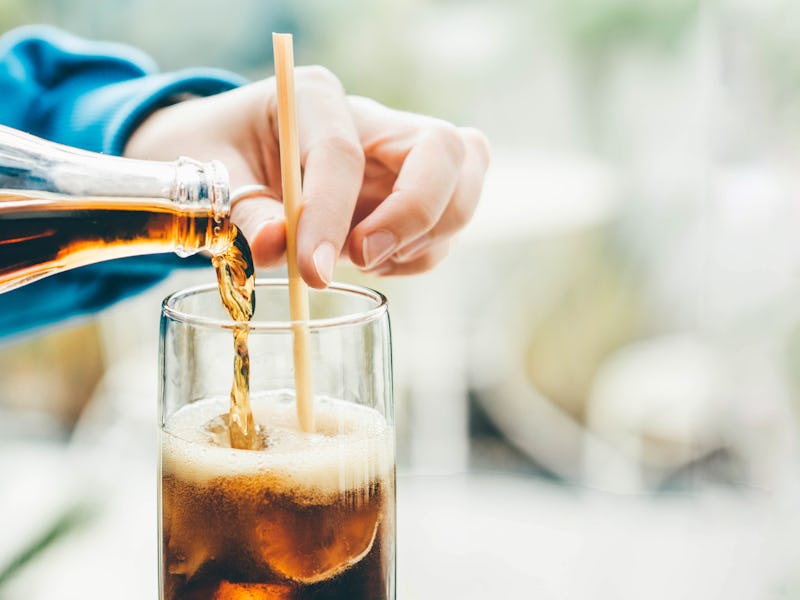Soda Brands Are Adding Fiber to Their Beverages — Here’s What Could Go Wrong
They’re not healthy — just healthier than soda (which isn’t that hard to be).

If there’s any truly good advice for every stage of life, it’s to eat more fiber. The indigestible carbohydrate satiates appetite, supports gut health, and makes for regular bowel movements. Unfortunately, most Americans don’t get nearly enough of it. The United States Department of Agriculture has found that Americans consume only about 16 grams of fiber daily, while the recommended intake is almost twice that, with a range of 25 to 38 grams per day.
Soda is heeding this wisdom. New soft drinks companies like Olipop and Poppi have products that contain as much as 9 grams of fiber (and, as another healthy glow-up, between 2 and 5 grams of sugar). Both brands tout themselves as gut-healthy sodas, with Poppi claiming that it’s “for a healthy gut” on the can and Olipop boasting that drinking it “benefits the microbiome, digestive function, and metabolic health.” But can adding fiber to a carbonated beverage really improve gut health?
These products contain inulin, a type of dietary fiber. Specifically, inulin is one type of a group of carbohydrates called polysaccharides. These plant-made compounds have been dubbed “prebiotics” because they pass through the small intestine undigested. Once they reach the colon, the trillions of bacteria that reside there feast on these carbs, which then ferment into byproducts called short-chain fatty acids. The gut produces the highest levels of these metabolites. Studies show they have anti-inflammatory, anti-tumor, and antimicrobial effects.
The amount of inulin in these sodas ranges between 2 and 9 grams per 12-ounce can. But it is far better for your gut health to get your daily fiber needs from whole foods rather than supplements, according to Ilana Kersch, a registered dietitian and clinical nutritionist specializing in digestive diseases at New York-Presbyterian/Columbia University Irving Medical Center.
“The best way to add prebiotics to your diet is to eat a variety of plant foods that naturally contain these fibers,” Kersch tells Inverse. A vast menu of plants naturally contains prebiotics, including garlic, Jerusalem artichoke, dandelion greens, asparagus, onions, green bananas, jicama, oats, barley, and wheat bran, she says.
While these new types of pop deliver some fiber, they lack what foods like lentils, spinach, and apples all have to offer. “Whole foods also contain a mix of digestive and indigestible carbohydrates, vitamins, minerals, and polyphenols [naturally occurring plant compounds] that interact to support a healthy gut in ways that a single isolated prebiotic fiber cannot provide,” Kersch says.
These beverages aren’t so much healthy as they are healthier than what we’ve already been drinking, Christopher Damman, a gastroenterologist at the Digestive Health Center at the University of Washington Medical Center, tells Inverse. Damman also says that the way we consume fiber changes its health benefits. Fiber and polyphenols are contained within plant cell walls and their energy-storing vacuoles (a flashback to high school biology, for sure), which require some vigorous chewing in order to access.
“Whole foods have an intact cellular structure,” he says. “Our body has to work to digest and absorb it.” Processing (milling, refining, or extracting) decimates that hard-to-break structure, which means our digestive system doesn’t get all the benefits of processing them itself. Part of why fiber keeps us feeling sated is because those nutrients are less readily available, so it takes longer to process. The fiber in these sodas will still make it to the lower gut, but as it’s already been processed, our gut microbes won’t get the exercise they crave from trying to extract the nutrients.
“Food is meant to come packaged together,” Damman says. “The best way to get fiber is always going to be in the form of whole foods.” But he realizes life is busy, and whole foods are often expensive, so processed food is appealing. What’s more, we have the ability to improve the junk food we have, as these companies have done with soda by adding fiber and dramatically lowering sugar content. But while they’re healthier, they’re not necessarily healthy. “Are they as good as drinking tea, water, and having an apple? No.”
Kersch advises that people with sensitive stomachs “should be cautious when trying probiotic sodas.” These fibers may lead to bloating, cramping, and diarrhea from less than a can. She recommends that these folks opt for versions with Stevia or monk fruit, which are less likely, she says, to cause digestive distress compared to other sugar substitutes.
In all, these new sodas dare pop lovers to make healthier choices without giving up their favorite beverage. One of these drinks might make an excellent addition to a lunch of lentil stew with seeded bread.